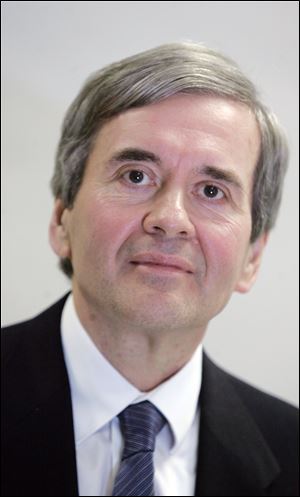
Commentary
Time for plain talk — and action — on racism in Toledo
Next week’s forum is just the start of the journey; similar dialogues are planned every other month
9/1/2013
David Kushma.
In the charged aftermath of the acquittal of George Zimmerman in the shooting death of Trayvon Martin, a lot of Americans have argued that we need to engage in honest, candid conversation about race if we are ever to overcome our economic and social divisions.
The 50th anniversary last week of the March on Washington reminded us of how much progress our nation has made in race relations since the civil rights era — but also how much farther we still have to go. In Toledo, The Blade’s recent series on youth gangs described how poverty and lack of opportunity help cause young people to turn to crime, blighting their lives and their neighborhoods.
We need to do more than talk about such ills, of course. But peaceful, constructive action starts with open and productive dialogue. So the Toledo Community Coalition and The Blade invite you to take part in starting a community conversation about racism and other vital issues that affect this city and region.
That forum, “Changing Minds and Changing Lives: Combating Racism,” will occur at 7 p.m. Sept. 12 at Woodward High School in North Toledo. We hope it will be the first step in a journey that will strengthen our community and improve the lives of everyone in this metropolitan area.
The featured speaker at next week’s event is Tim Wise, an educator and author of the memoir White Like Me: Reflections on Race from a Privileged Son. He’ll talk about racism, both institutional and individual, and about white privilege, challenging audience members to change the way they think about race.
A panel discussion will follow, dealing with the issues Mr. Wise raises and their application to Toledo. The panel will include Baldemar Velasquez, the president and founder of the Farm Labor Organizing Committee. Other panelists are being added. They will take questions from the audience.
Organizers are inviting hundreds of this community’s most prominent leaders to attend the forum. But it’s not just for power brokers; Woodward’s auditorium can accommodate plenty of other people, so we hope you’ll come too. And the event isn’t limited to Toledoans; it’s important that suburban residents add their voices as well.
Next week’s forum is just the start of the journey. Similar dialogues are planned every other month. Topics of upcoming sessions include education, criminal justice and corrections, and inter-generational poverty, and how all of these issues are related to race. A future forum may involve gang members. Other potential subjects include housing and economic development.
In between, organizers plan to convene small, mixed-race study groups whose members will get together over several months, in locations across the metropolitan area. They will discuss the topic of the most recent community forum, build relationships, and tell each other their stories. The process is called “dialogue to change.” Similar efforts have succeeded in Columbus and Cincinnati.
I sat in on a planning committee meeting last week for the first community forum. We heard of how one of Toledo’s best-known African-American leaders acknowledges that getting stopped by police remains a routine occurrence for him. That’s just the way it is, he shrugs.
One thing everyone agrees on: If the first forum and the events that follow amount to just another polite discussion that generates a report that gathers dust on a shelf, the effort will be a failure. And even though this is an election year, politicians won’t be allowed to hijack the forum for their own purposes. It’s time for action.
“Let’s really talk about this,” said Lenora Barry, a former federal probation officer who works with the Reentry Coalition of Northwest Ohio, which helps ex-offenders reconnect with their families and communities. “We need to be honest enough to tell the truth.”
She repeated a slogan she heard in Washington at an event last month observing the half-century anniversary of the March for Jobs and Freedom: “Commemorate — then go back and agitate.”
Added Bernard “Pete” Culp, a Toledo-Lucas County Port Authority board member: “We can’t just deal with the symptoms. Conversation is nice, but it’s not going to change things for a young guy looking for a job. We need to produce the kind of change that will affect young people’s lives.”
The Rev. Karen Shepler, until recently the pastor of Monroe Street United Methodist Church and a longtime community activist, said the forum and related activities are “huge.”
“We want the [study] groups to come up with an action plan to cooperate to do something about racism,” she said. “We want people to have an epiphany experience, to say: ‘Oh my God, I never thought about that’.”
The Rev. Otis Gordon, pastor of Warren AME Church, agreed. “We need to reach the average person in the average neighborhood who has no idea what racism is all about,” he said.
There’s plenty of work for everyone to do: public institutions, private corporations, churches, philanthropic groups, unions, news media, and just folks. If this dialogue can help to dispel fears and misconceptions related to race in our community, we can truly change not just the way we think about ourselves and each other, but also about the way we live together.
If you care about the future of this community, surely that’s worth at least two hours of your time on a Thursday evening.
For more information about the community forum, you can write to toledoforum@gmail.com
David Kushma is editor of The Blade.
Contact him at: dkushma@theblade.com or on Twitter @dkushma1